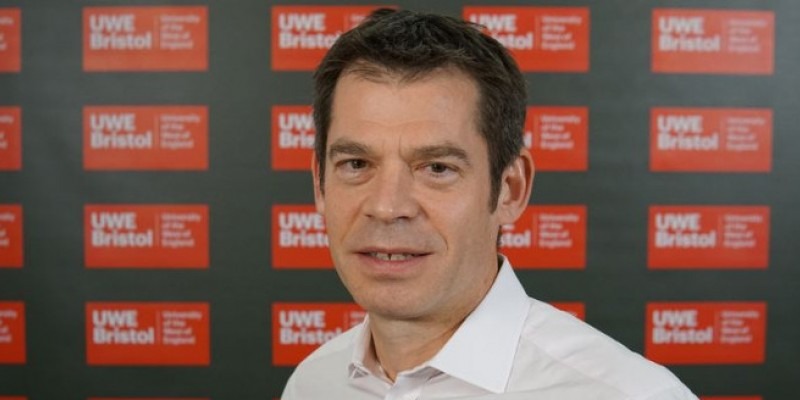
UWE, in partnership with Business West, runs an annual lecture series that brings top business leaders to Bristol. We caught up with Joe Garner, CEO of Nationwide, before he gave his address:
1. How on earth do you lead a business on the scale of Nationwide?
What makes us truly different is that we’re not a bank, we’re not a company, we’re not a corporate. We are a society and we were founded with a social purpose, opposed to a commercial purpose, which is to help improve living conditions for what our founders called “the industrious classes”.
If you roll forward to today, yes, we are a big business, but what drives us is fundamentally different from what drives a lot of our major competitors.
That starting point has been the starting point for me as chief executive.
2. You’re a mutual organisation – what does that mean?
There are different kinds of mutual organisation. For example, John Lewis is a mutual organisation, but they are owned by their employees.
Nationwide is a mutual – we are owned by our customers (our members).
We don’t have shareholders in a traditional sense, we don’t have to pay a dividend to third party investors, our ownership is in the hands of our members.
That means there’s a real alignment of interest as well, meaning our singular purpose is to serve members of today and tomorrow.
3. But you also have to make them money because they invest with you.
We have to make sufficient money.
We have to make sufficient profit to ensure the financial security of the society in good times or in bad, but we don’t have to maximise our profitability and that’s the real difference.
So, what we do is we tune our profitability to balance the maximum interest that we can pay to our savers, while making sure we’re giving our borrowers really competitive rates and contributing to wider society.
We don’t have to maximise profit, we have to make sufficient profit and that enables us to think over the long term.
A recent small example of that: we recently announced that we won’t be doing quarterly reporting, we’ll report every half year.
That’s a reflection of how we’re really focussed on the long-term interests of our members and wider society.
4. Is that what attracted you to the job – to lead an organisation that isn’t aggressive in the way that many banks and building societies might be?
Totally. Mutuality is what drew me to Nationwide.
In all the different areas that I’ve been fortunate enough to work in, I’ve always worked in organisations that either have the customer at the heart of their operation or are trying to put the customer at the heart of their operation.
At Nationwide, the customer genuinely is central to our purpose and therefore runs through everything, but of course we need to be a commercial organisation too.
The laws of commerciality aren’t different just because our purpose is different, we still need to run a tight operation, manage risk, innovate and invest for the future.
5. Tell me a little bit about the housing project Nationwide is involved in.
Building societies originally used to pool peoples’ savings and use that money to build houses.
Over time that turned to mortgages, so we lend mortgages and give interest to savers.
There is still a housing shortage in this country. It’s a major issue for people. There are also issues in the rental sector.
So, we thought, well look, we’re the biggest employer in Swindon – we employ 6,500 people – we’re a building society, there’s a national shortage of housing, let’s not just campaign on this issue, let’s do something about it.
We’re not actually doing the construction – you’ll be pleased to hear - we are working with a partner with experience of building not just units that will sell, but constructing communities that will thrive.
What we’re looking at is working closely with the local community to construct an intergenerational place where there is a sense of community.
If it works then great, it will be a contribution in itself, but we’re also learning a lot and it’s something that others may choose to follow, which will be a contribution too.
6. What advice have you got for future graduates?
I love a quote from John D Rockerfeller – the oil billionaire – who was asked the same thing by a student.
Allegedly he said 3 things; first get up early, second work hard, third strike oil.
For everything that is said about this subject – there’s a lot of luck involved.
With that in mind, the advice I always give - apart from ignore everyone’s advice - is do what you love doing.
If you do anything else, it will be obvious and you won’t do it as well. If you do what you love doing, you will do it well and succeed.
I know it might be a slightly controversial piece of advice and counter to those that say you need to build your CV, but I would say whatever you do make sure it’s something you love doing. Life is too short.
This series of free public lectures brings top level business leaders to Bristol. You can discuss these events on Twitter using the hashtag #BristolLectures and view further content from Joe Garner’s lecture here. For more information please contact events@uwe.ac.uk.
- Log in to post comments
